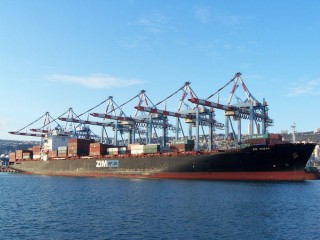 Israeli shipping line Zim announced it will seek the approval of the Federal Maritime Commission (FMC) of the United States allowing it to cooperate with the G6 Alliance on the restructured Asia-East Coast service network that starts May this year.
Israeli shipping line Zim announced it will seek the approval of the Federal Maritime Commission (FMC) of the United States allowing it to cooperate with the G6 Alliance on the restructured Asia-East Coast service network that starts May this year.
In a statement, the liner operator said the cooperation will include a new joint service with G6 and a space slot exchange.
The proposed joint G6/Zim SCE service will replace the existing GA/ZIM SCE combo service and will have Zim deploying five of nine vessels on the loop. Its intended rotation is Xiamen, Yantian, Da Chan Bay, Hong Kong, Kaohsiung, Panama Canal, Manzanillo, Kingston, Savannah, Charleston, Kingston, Manzanillo, Panama Canal, and Xiamen.
The slot exchange will be for two all-water East Cost services crossing the Suez. The AZX service will have a port rotation of Laem Chabang, Singapore, Colombo, Suez Canal, Damietta, Cagliari, Halifax, New York, Savannah, Norfolk, Cagliari, Damietta, Suez Canal, Singapore. The CEC service will make calls in Hong Kong, Shekou, Yantian, Singapore, Suez Canal, New York, Norfolk, Charleston, Suez Canal, Singapore, Cai Mep, and Hong Kong.
The carrier’s services on the Asia-US East Coast/Central America/Caribbean trade lane will continue, adding new links via Suez from South China and Southeast Asia.
The FMC voted recently to allow the G6 Alliance to increase the frequency of vessel port calls on the U.S. East Coast.
Under this new agreement, the G6 Alliance will deploy more than 50 ships in the trans-Pacific trade, calling at almost 30 ports in Asia, North America East Coast, Canada, Central America, Caribbean, Indian Subcontinent, Mediterranean, and the Middle East.
Meanwhile, Zim said it has cancelled five newbuilding orders and postponed delivery of other vessels to 2016 in a move that relieves the company from financial obligations amounting to US$1.4 billion. It also has an option to cancel four additional orders.
Zim said it will get a refund of $30 million on its advance payments for the cancelled orders. The agreements postpone or cancel payments due in 2013 amounting to $235 million. The company expects to lose $133 million in the fourth quarter of 2012 as a result of the cancellations.




